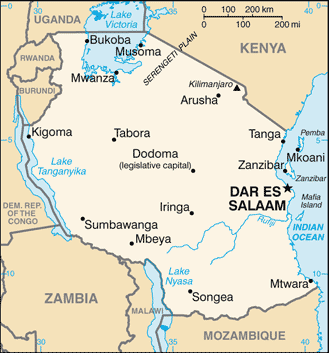Tanzania

The United Republic of Tanzania has an estimated population of 45 million (UN, 2010). The capital is Dar es Salaam. Tanzania has an area of 945,087 sq km (364,900 sq miles). The main languages are English, and Swahili
In 1964, Tanganyika merged with the newly independent island of Zanzibar to form what it is today called Tanzania. Since gaining its independence, Tanzania has been a stable and peaceful country.
Women are widely discriminated under traditional customs in rural and urban areas. Violence against women such as domestic violence, early marriage and female genital mutilation is highly prevalent in the country. One of the main reasons for the increase of HIV/AIDS in Kenya is traditional practice of wife inheritance.
- Tanzania ratified the Protocol to the African Charter on Human and Peoples' Rights on the Rights of Women in Africa (The Maputo Protocol) on the 3rd of March 2007.
- The Convention on the Elimination of All Forms of Discrimination against Women (CEDAW) was ratified by Tanzania in 2006.
- Tanzania has not yet adopted National Action Plan on United Nations Security Council Resolution 1325 (UNSCR).
- There are no former or current UN peacekeeping mandates in Tanzania.
